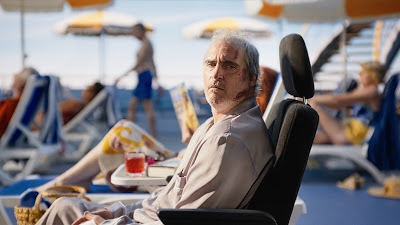 |
| All photos courtesy of A24 |
Ari Aster is obsessed with fucked up families. In Hereditary (2018), he focused on generational trauma. He followed that up with Midsommer (2019), a folk-horror-style film about cults and how they can prey on people by pretending to be the family they miss. Even his earlier work, like the 2011 short film The Strange Thing About the Johnsons, explores toxic familial dynamics. The man cannot seem to pull himself away from digging his cinematic finger into gaping emotional wounds, tearing them open for everyone to see.
In Beau is Afraid (2023), Aster has his sights on a single man, middle-aged Beau Wassermann (Joaquin Phoenix). Beau lives by himself in a shabby apartment in the seedy part of an unnamed city. He is riddled with anxiety and spends his day nervously navigating his errands, running for his life from place to place, and avoiding contact with other people if he can help it. In between his constant battle with fight-or-flight, Beau visits his psychiatrist (Stephen McKinley Henderson) to discuss his relationship with his mother and his various fears.
Right away, it's apparent that the universe that Beau resides in is a surreal exaggeration of the real world. The streets are full of naked homeless people murdering each other in plain sight; a man with heavy body modification chases Beau in front of his apartment every day on a schedule. The news has headlines like "Bad Stabby Man Stabs People," and every wall is adorned with perverse graffiti and hastily scrawled cocks. It is simultaneously over-the-top but strangely familiar: only one or two shades brighter than the world we currently exist in. It could be that it is our world, and Beau's anxiety warps it into the depraved view the audience sees.
As the cherry on top of the generalized anxiety sundae, Beau has to go home to visit his mother. His mother lays on the guilt trips hot and heavy, and Beau dreads the journey with every fiber of his being. Unfortunately, he also has the worst luck of all time, and a series of terrible events puts roadblocks in the way of his trip. These events spur an adventure, where Beau has to make his way through various situations to make it home finally. The film is divided into several chapters, each with its own characters and aesthetic, in which Beau has to navigate both his and others' neurosis. Phoenix does a fantastic job selling Beau's frantic apprehensiveness and need to please everyone, but he's always good with dark horse type characters.
Each chapter focuses on a different idea: addiction to prescription drugs and the death of the American dream in a quiet suburb, a take on A Midsummer Night's Dream with a traveling play troupe, an homage to the stylized kabuki storybook look of The Ballad of Narayama (1958), finally ending on a Mommy Dearest (1981) horror show. Throughout all this, Aster's dark humor pops up consistently but never when you expect it to, casually winking at the audience. Aster isn't taking this seriously, and he doesn't think you should be, either. At some points, he is channeling Alejandro Jodorowsky's penchant for Dadaist set pieces and surrealism.
The pacing is by far the worst aspect of the film, primarily because of the hills and valleys of each vignette. There are essentially four climaxes in the narrative, and after each one, it gets a bit harder to focus on the bigger picture entirely, and it gets increasingly muddled as more players are added. Thematically this could be on purpose to put the audience inside Beau's head, as his entire life is a chaotic horror show, but it can prove tedious at times.
Beau is Afraid is a distinctive art piece full of idiosyncrasies and asides. It's like sorting through someone's smelly, dirty laundry piece by piece. Like all personal art, by its nature, it will not appeal to everyone, but those who resonate with it will find it endlessly fascinating.
--Michelle Kisner


